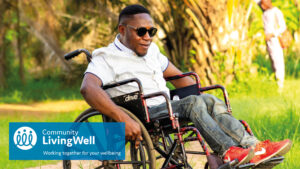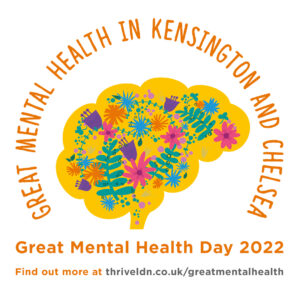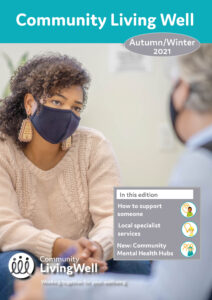Latest News
Talking Therapies: Amal’s Story
 Amal, who is a part of the local Muslim community, had been struggling with difficult feelings for a while, but she didn’t know why or how to cope with them.
Amal, who is a part of the local Muslim community, had been struggling with difficult feelings for a while, but she didn’t know why or how to cope with them.
She had tried to seek help before but could not find someone who understood her situation, and it ended up making her feel worse. Determined to feel better, she spoke to her GP who introduced her to the NHS Talking Therapy service.
Amal wanted to share her story with us in the hope it would encourage others to try Talking Therapy.
How did you hear about Talking Therapies?
It was from my GP. I went to see her because I was experiencing flashbacks, night terrors and intrusive thoughts. I didn’t know what it was. An incident had occurred in my life, and it all started soon after that, I just didn’t realise that they were related.
I’d been feeling this way for a long time, but it wasn’t until my GP mentioned that my symptoms matched those of post-traumatic stress, she suggested I see a specialist.
What happened after you’d been referred?
I was referred to the Talking Therapies service, but while I was waiting for an appointment, I was introduced to the Talking Therapy workshop about PTSD. This is where it all came to light for me.
The workshop taught me how to deal with the symptoms and helped me to understand why I was feeling this way. I learned some techniques in the workshop before I started my sessions, which worked really well for me. It was a great eye-opener and good introduction to the therapy.
The workshops were held online, which really helped as people could have their camera turned off – it made them feel more comfortable if they wanted to speak. You could talk to each other as a group, and we got the chance to share our own stories and experiences about what we’re going through.
Knowing that there are people out there who are going through something similar really helps, then you know that it’s not just you. You’re not the only one feeling like this.
When you started your sessions, how were theses arranged?
My sessions were over the phone due to Covid. My therapist understood that there are cultural differences, and this really stood out. When speaking to me, she mentioned to me about my culture and my background and that made me think, ‘wow, this is good!’
People in the Muslim community find it difficult to go for therapy because of the cultural differences. There are certain things we can’t do or aren’t accepted in Islam, so we need the therapist to understand these things. The impact of a trauma on yourself is one thing, but the impact it has on your religion is another trauma altogether. So, to find someone who understood this was very good.
Can you talk me through how the sessions were run? What did they involve?
My first session didn’t start well. I was angry, I was frustrated and annoyed. I hadn’t had the correct help in the past, so it had all built up inside me. The way the therapist dealt with the situation really caught my attention. She was so professional and the way she turned it around and how she handled the entire conversation, it developed into something really positive.
The whole service in itself was good. It felt confidential and personal. My therapist helped me to develop goals and to use tools to manage my symptoms. I was taught to be kind to myself, to have control over my thoughts and feelings, and also to know that it’s ok not to feel ok.
Would you recommend Talking Therapies to someone who is going through something similar?
Yes, absolutely. Coming from a Muslim community and background where mental health is taboo, I would recommend this service most definitely. They are very sensitive to our norms and values. I feel like there’s a lack of Muslims getting professional help, because they think they’ve tried something in the past that didn’t work, that wasn’t compatible. I wanted to share my story to show other Muslims, and people from other religions and cultures, that this can work.
In my area, there are people that have not only witnessed Grenfell, but they’ve also had their own traumas to deal with. So, trauma on top of trauma. I would encourage people not to give up, and to keep trying. I came out of this service a different woman, and I wanted to share that.
If you need support with trauma, stress, anxiety or depression…
If you have experienced something similar to Amal and would like try Talking Therapy, you can refer yourself by completing the form available here or call 020 3317 4200.
Learn more about Talking Therapies and how it can help you here.
This story was originally published in the Autumn/Winter 2021 edition of the Community Living Well magazine. It has been edited for website purposes. You can sign-up to our mailing list to receive the magazine directly into your inbox.
Author: Stewart Gillespie
Category: Community Living Well, Talking Therapies
Posted on: 8th April 2022
How physical activity helps mental health
 Taking regular exercise can have a huge positive impact on our mental health and wellbeing. We’ve highlighted some of the ways how physical activity helps mental health.
Taking regular exercise can have a huge positive impact on our mental health and wellbeing. We’ve highlighted some of the ways how physical activity helps mental health.
Recommended physical activity
The recommended amount of moderate physical activity we should be doing is two and half hours per week. This regular physical activity helps with many health benefits, hopefully leading us to live longer, healthier lives, which includes an improved mental health.
Don’t let the thought of exercise cause you additional worry and stress; it doesn’t mean you have to join a gym or complete a marathon! Exercise can be anything that gets us moving; from doing our weekly shop or cleaning the house, to dancing or going for a walk.
If you are living with a disability or you are not comfortable leaving the house, there are lots of suitable options available online. Disability charity, Scope, has information about exercising at home, or you can search for at-home workouts on YouTube.
Mood Boost
Studies show that physical activity has a positive effect on our mood. Any form of physical activity can help us to feel calmer and content. The benefits are more noticeable when our mood is lower than usual, so if you are living with depression, anxiety or stress, you are likely to feel an improvement in your mood if you take some form of exercise.
Reduce Stress
Stress affects us all at some point. Research shows that physical activity can be effective at relieving stress, and those who are more active tend to be less stressed than those who are less active.
Boost Self-Esteem
Taking regular exercise can help to make us feel good about ourselves. Once you’ve completed some form of physical activity, you will feel a sense of achievement, which makes us feel good. It can also help our physical health and appearance by keeping fit.
Increase Energy Levels
Regular exercise can increase our energy levels throughout the day and even enhance our ability to learn and memorise new things.
If you need additional support…
The Community Living Well Peer Support service arranges group walks in local parks, which is a great opportunity for you to take some exercise, get some fresh air and meet with people who may have similar experiences. You can refer yourself to the Peer Support service by completing this online form, or by calling 020 3317 4200.
One You Kensington & Chelsea and One You Westminster also provide useful information, advice and opportunities to introduce physical activity into your daily routine.
Author: Stewart Gillespie
Category: Community Living Well, Peer Support
Posted on: 4th March 2022
Considering a career change

The prospect of a career change, particularly in an uncertain economy, can be daunting, and switching jobs is never a decision that should be taken lightly. The Community Living Well Employment Support team can help you identify transferable skills and give tips on how to apply for a new job.
Over the past two years, the amount of people who have changed their career has risen sharply. The Covid-19 pandemic gave many people time they might not ordinarily have had to take stock and think about where they are in their lives, and whether their careers are making them happy or unexpected job loss may cause people to change track.
The average person will change jobs 5-7 times during their working life. This might be due to changes in career goals, personal circumstances or because they are ready to try something new.
Identifying transferrable skills
As the name suggests, transferable skills are skills that can applied in a variety of job roles. These skills could be gained from previous work experience, volunteering or even tasks you do on a daily basis, like managing personal budgets, for example. Think about and write down what you’ve learnt and how these skills could be transferred to your desired job. If you have a particular role in mind, you can see how your current skills set matches up to the job description. Going through this exercise can also help you identify any skills gaps you might have and encourage you to enrol in training courses or qualifications.
Knowing your transferable skills can enable you to think ‘outside the box’ of your past experience and identify new opportunities. Some of these common skill areas include:
- Communication
- Problem-solving
- Time management
- Digital skills
- Collaboration
- Flexibility
Access support
We offer up to 15 one-to-one sessions where you can discuss with your allocated employment advisor what your goals are and what you would like to achieve. Some people know what they want, whereas others may want a change in direction or get into work for the first time. The sessions are based around your individual needs and we can help you look at your options, skills and interests to help you decide what kind of work you would like or how you could change your career path.
Together we could…
- Explore how to get started and identify entry routes into your new career.
- Identify any skills gaps and training opportunities.
- Update CV and application forms to showcase transferable skills and relevant work experience.
- Explore the financial implications of changing careers and whether there are bursaries or grants.
- Discuss how work-related benefits might be impacted by changes in circumstance.
- Practice interview skills.
If you would like help identifying transferable skills and job opportunities, you can make a self-referral to the employment service at Community Living Well. The employment team are working remotely and will be introducing face-to-face appointments in line with government Covid regulations soon. We may be able to support you remotely
via telephone and online services.
This story was originally published in the Autumn/Winter 2021 edition of the Community Living Well magazine. It has been edited for website purposes. You can sign-up to our mailing list to receive the magazine directly into your inbox.
Author: Stewart Gillespie
Category: Community Living Well, Employment
Posted on: 10th February 2022
Great Mental Health Day 2022
 Great Mental Health Day in London 2022
Great Mental Health Day in London 2022
Across London, organisations and individuals are joining together to celebrate London’s first ever Great Mental Health Day.
The aim of the day is to get us talking about mental health, highlight the great support available, and, crucially, take the stigma out of asking for help when we need it. It is also the chance to share ideas on what we do to support each other and our communities through the most trying times.
Thrive LDN will be updating the campaign page with more information about the day as well as activities and events you can join in the run up to it.
You can also get involved using the hashtag #GreatMentalHealth to share your own tips, advice and experience across all social media platforms. As part of this, we’d love to see a short clip of you answering one of the following:
- What do you do to improve your own mental health?
- What makes you feel connected to others?
- What do you do to support others in your community?
For more information about Great Mental Health Day, visit Thrive LDN’s website.
You can refer yourself to Community Living Well here.
Author: Stewart Gillespie
Category: Community Living Well
Posted on: 28th January 2022
Overcoming obstacles with a long-term condition: Luca’s story

Coming to terms with a long-term condition can be challenging, particularly with managing symptoms and making changes to your day-to-day life. It can have a detrimental effect on your mental health, causing anxiety and depression. Luca who has Chronic Obstructive Pulmonary Disease (COPD) talks to us on how the service helped him re-focus his life and adopt a new mindset on the illness and build his confidence.
What led you to be referred to CLW Talking Therapies?
I had a difficult time in the summer; I was emotionally eating at home on my own, feeling sorry for myself and depressed and had no social life. Sleep wasn’t good, I was falling asleep early, waking up in the middle of the night, staying up, watching television, eating and then falling asleep again.
The COPD team referred me because I was having problems dealing with the oxygen I needed to take. I didn’t accept that I needed it, so they got a bit concerned. I caught a chest infection that took six weeks to clear up, and I thought ‘this is my life, struggling to go to the next room.’ I was aware that I needed to take the oxygen but emotionally I wasn’t accepting of it, I feared I would become reliant.
What long-term condition are you living with?
My main issue is COPD, lung emphysema. It’s a chronic condition and it’s not going to get better. I was diagnosed in 2010 and have been on oxygen therapy since July last year. I also have a cervical problem that is beginning to affect the tips of my fingers, which is annoying as I was a guitarist. I can’t play sports and it takes time for me to get dressed. I lost a lot of self-confidence as my health has deteriorated because of the chest infection. I have to use the oxygen whenever I move.
What did your therapy focus on?
My therapist helped me to re-focus my life, rather than fearing death. I realised there’s no point in focusing on things that I can’t control; it will just drive me mad. We looked at what was going on for me emotionally but also at my values and where I wanted to go. I went to weight management which was important because putting on weight affects my breathing. The therapy rebooted me and I had a renaissance; I was attending talks, a philosophy class, walking every day, doing cooking classes and sleeping better now.
Did you have any difficulties or challenges?
Using the Cognitive Behavioural Therapy (CBT) approach, my therapist was able to make me find tools I previously had. I didn’t always do the homework, but once the ball started rolling we were doing things on the whiteboard. My therapist used it a lot to explore my thoughts and feelings about my illness.
How do you plan on keeping up your progress?
I’m going to keep doing what I’m doing. Exercise is good for my health, I meet people now, I talk philosophy, I cook every day and I’m mindful of what I put in my body.
Do you have any advice for others who are struggling?
Asking for help is not a sign of weakness. There is no harm in admitting that we cannot do it all on our own. Whenever I asked for help I’ve received it.
If you’re living with a long-term condition and feel you need support…
You must be referred to our Talking Therapies if you’d like to access the service. Please fill out the form available here or call 020 3317 4200.
Learn more about Talking Therapies and how it can help you here.
This story was originally published in the Winter 2020 edition of the Community Living Well magazine. It has been edited for website purposes.
Author: Michelle Jackson
Category: Community Living Well, Talking Therapies
Posted on: 14th January 2022
Book Talking Therapies (IAPT) appointment via text

We are pleased to let you know that from 4 January 2022, those who refer to Talking Therapies (IAPT) will have the option to book their initial telephone appointment (triage) through their mobile phones.
We believe this will give you more choice over your appointments, as you will be able to select a time and date that best suits your availability. This will be a simple process: once your referral has been accepted, you will receive a link via SMS to click on and book in for your appointment.
In some instances, such as e.g., if you require an interpreter or do not use a Smart Phone, a member of our admin team will call you directly to book you in, rather than being sent an appointment link you may not understand or have access to.
Find out more about Talking Therapies (IAPT)
Refer yourself to the service here.
Author: Stewart Gillespie
Category: Talking Therapies
Posted on: 24th December 2021
Autumn/Winter 2021 magazine available now!
 The Autumn/Winter 2021 edition of Community Living Well magazine is now available to read online.
The Autumn/Winter 2021 edition of Community Living Well magazine is now available to read online.
In this issue, you’ll find articles on:
- where to get support with benefits and employment
- where and how to access specialist local services
- the Well Read play-reading group
- services offered by Community Massage London
We also spoke to Amal, a member of the local Muslim community, who has recently completed some Talking Therapy sessions for support with her anxiety. She wanted to share her story in the hope it would encourage others to get support.
Read the Autumn/Winter 2021 edition (best for desktop viewing)
Read the Autumn/Winter 2021 edition (best for mobile device viewing)
To sign-up to receive the Community Living Well magazine direct to your inbox, complete this form.
Author: Stewart Gillespie
Category: Community Living Well
Posted on: 10th November 2021
Introducing Community Mental Health Hubs
 We are very excited to announce the launch of the new integrated community hub model in Kensington and Chelsea and the Queen’s Park and Paddington area of North Westminster.
We are very excited to announce the launch of the new integrated community hub model in Kensington and Chelsea and the Queen’s Park and Paddington area of North Westminster.
Community Mental Health Hubs
The move towards Community Mental Health Hubs is part of a national direction of travel to bring together primary and secondary care mental health services providing a more joined up and seamless experience, both for people receiving services and their carers.
Over the past year, teams in Kensington and Chelsea and Westminster have worked closely with local stakeholders – GPs, local authorities, service users, carers and the third sector – using learning from other CNWL boroughs who are working to the new model and the NHSE framework, to design and implement this change.
Specialist mental health care
Under the new model, we’ve created integrated and local Community Mental Health Hubs, which promote community resources working together as one team, centred around local Primary Care Networks, to deliver care based on the needs of the population. The Community Hubs will provide access to a range of mental health specialists, such as GPs, nurses, therapists, social workers, pharmacists and employment support and navigators, all of which will work together to help people on their journey to recovery by providing interventions-based care (like psychosocial interventions, medicines management, and more).
Additional funding has been used to expand the offer, with the addition of more Community Navigators and Peer Support workers, and staff that will help provide dedicated support to those with Complex Emotional Needs.
The model is set up to promote simple routes for GPs to obtain mental health advice and support for patients, as well as triage led by highly-qualified mental health staff to make sure patients get to the right person first time. This closer working with local GPs will help to share learning, improve communication and avoid siloed care, and builds upon the work done by the current Community Mental Health Teams (CMHTs).
This will better the lives for our patients by:
- helping service users access/receive mental health treatment faster when required, preventing relapse
- ensure care is more personalised as service is tailored to local need of the population
- increasing the consistency of care
- making the process to get help simple with no need to repeat their story.
Community Living Well is the current provider of primary mental health care in the area. The Hubs join Community Living Well to deliver the integrated service. This improved service recognises the importance of community and will be working in collaboration with local charities and voluntary organisations to help people connect and make use of their local assets, as well as address social needs such as housing, substance misuse, carers’ support and financial advice.
This is the beginning of an exciting journey where care is joined up and centred around the service user to help them achieve the best outcomes and enjoy their lives.
For more information…
If you or someone you know is experiencing mental or emotional distress, speak to your GP. You can find out more about Community Living Well and the Community Mental Health Hubs, including how to self-refer to some services, at communitylivingwell.co.uk
Author: Stewart Gillespie
Category: Community Living Well
Posted on: 1st November 2021
World Mental Health Day 2021
 Sunday 10 October 2021 is World Mental Health Day. World Mental Health Day is observed every year, with the overall objective of raising awareness and breaking down the stigma of mental health issues around the world.
Sunday 10 October 2021 is World Mental Health Day. World Mental Health Day is observed every year, with the overall objective of raising awareness and breaking down the stigma of mental health issues around the world.
The stigma and discrimination experienced by people who experience mental ill health not only affects that persons physical and mental health, stigma also affects their educational opportunities, current and future earning and job prospects, and also affects their families and loved ones. (Source: World Federation for Mental Health (WFMH))
Prioritise your mental health
Your mental health should be your priority because it impacts our whole life. We want to raise as much awareness as possible on this World Mental Health Day, and to remind you that Community Living Well is here for you.
We offer the following services:
- Talking Therapies (IAPT) – Short-term support for when you experience difficult emotions, such as, low mood, worry and stress
- Peer Support – Wellbeing workshops, one-to-one peer support, peer support groups, social activities and peer support training with other people who have had similar experiences to you
- Employment – Advice and support to gain and retain paid employment, improve your employability skills and know your rights in the workplace
- Navigators – Practical support with a range of issues including benefits, debt, housing options, access to health and social care services and support to access specialist advice and information
- Self-Care – Support and activities that help you to take care of your own mental, emotional and physical wellbeing
You can refer yourself to the Community Living Well service here.
These local organisations also offer crucial support.
Author: Stewart Gillespie
Category: Community Living Well
Posted on: 4th October 2021
Pilot Mental Health Programme for Young People
Community Living Well Pilot Mental Health programme for young people aged 19-24 with mental health needs
The Community Living Well Self-Care service is trialling a new programme for young people aged 19-24 with mental health needs (in Primary Care), and who are registered with a GP in Kensington & Chelsea, Paddington or Queen’s Park.
The pilot mental health programme includes a choice of four options:
- A two-part series of (2) workshops – You may register to attend on your own or with a friend
- Seated therapeutic, fully clothed, massage or reflexology sessions for pain and relaxation
- 1:1 phone-guided meditation,
- 1:1 phone or online motivational coaching.
So, what is involved?
The two-part interactive workshops will explore breath work, meditation skills and the power of different pressure, to help increase confidence and capacity for decision making.
Both workshops will begin with an introduction to breathing/body-scan/meditation, in different positions (lying down, sitting, standing and moving), with discussion on how these affect the body. We break for lunch and offer a light lunch to participants.
The second part of workshop each workshop will be a practical session, guided by a qualified trainer. Participants will be given the opportunity to learn about the affect of different pressure, with discussion and feedback on how the it feels and whether it affects the body locally, mentally or emotionally. Participants do not have to take part in the practical element if they do not wish to but can observe and learn instead.
The session will close with a short guided meditation.
The Unwind therapeutic massage /reflexology sessions are aimed at improving relaxation and sleep and reducing pain and anxiety.
The guided meditation session, over the phone, will provide a listening ear and a focus to help with the concerns you express on the day and teach you meditation skills that you can practice on your own.
The motivational coaching via the phone or video call, will discuss which areas you feel need help with, provide encouragement and teach you achievable goal-setting strategies.
How to register
To register for this service, you must be aged 19-24 and registered with a GP in Kensington & Chelsea, Queen’s Park or Paddington. Complete this form and return it to [email protected]
Author: Stewart Gillespie
Category: Community Living Well, Self-Care
Posted on: 20th September 2021





